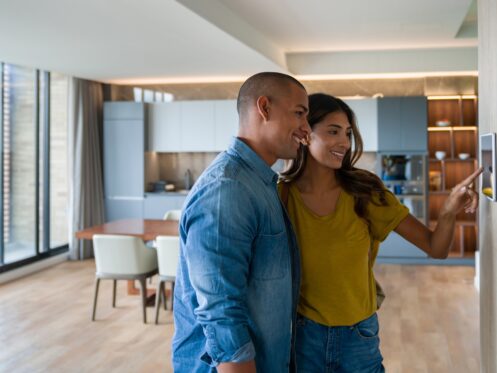Turning your air conditioner off before leaving your Bountiful, UT home might seem like a no-brainer. After all, why pay for air conditioning if there’s no one present to enjoy it? However, in reality, periodically shutting your cooling system down could lead to a noticeable spike in your energy bill. When your cooling system is optimally performing due to routine AC maintenance and working efficiently, it should actually stay on most or all of the time. Read on to find out why.
Turning the AC Off at Night or While You’re Away at Work
The nighttime hours typically usher in far cooler outdoor temperatures. As such, there’s rarely a need to have air conditioners running long and frequent cooling cycles. During the daytime when adults are at work and younger residents are at daycare or school, leaving your air conditioner running probably seems counterproductive to your energy savings goals.
Surprisingly, air conditioners work harder and use more energy when homeowners shut them down completely before leaving. With your air conditioner off, the temperature of the building interior will likely soar. When you or anyone else in the household returns, your air conditioner will have to work harder and run longer just to restore habitable conditions.
A far better alternative is slightly adjusting your thermostat setting before leaving or going to sleep. For instance, you might raise your thermostat setting by just five to 10 degrees Fahrenheit before going to work or bed, and then adjust this setting again just after you return home or wake up. When you use this strategy, only a slight temperature change will be required. This results in far less work for your air conditioner.
Making thermostat adjustments instead of completely turning your AC off also helps with ongoing humidity regulation. More often than not, people take hot showers and baths before turning in at night or just before heading out the door. With your AC completely shut down, nothing will be actively working to remove the residual moisture from these activities. Completely turning your AC off with excess humidity in your home for several consecutive days could leave you with mold and mildew issues that compromise your indoor air quality, your respiratory health, and the integrity of many building materials.
Solar Heat Gains and Your Plants and Pets
Although some pets and plants are more resilient to heat than others, you certainly don’t want to leave anything living in your home without the benefit of AC whenever you’re gone for more than one to two hours.
If you crate your dogs before going to work or have a bird, a pet rabbit, or a cat in your home, your animal will need active air conditioning all summer long. Even certain indoor plants can experience significant decreases in their health if the daytime temperatures within their environment exceed their heat tolerance.
How ACs Work and When Air Conditioners Should Be Turned Off
Air conditioners are designed to cool the air in closed, contained environments. These systems draw in warm indoor air, move it through their filters, and then pass it over their evaporator coils. The chilled refrigerant within these coils absorbs the air’s heat. Cooled air is then distributed throughout the building.
This heat transfer process is incredibly efficient. However, its efficiency dramatically declines whenever sealed environments are opened. Thus, although opening your windows wide to let fresh, nighttime air flow in might seem like a good idea, it will cause far more problems than it resolves when your air conditioner is running.
Open windows allow outdoor humidity and outdoor pollutants to enter the building. Your air conditioner might struggle with both air filtration and humidity regulation if you routinely sleep with your windows open and your AC running. Running your air conditioner with windows or doors open will also greatly increase your energy use given that much of your conditioned air will escape outside.
If opening windows at nighttime is your preferred way to ventilate and cool your house, you should toggle your thermostat from “ON” to “FAN.” When you’re ready to close your windows, simply turn your air conditioner from “FAN” back to “ON.” This will help your unit stay on top of air filtration and humidity regulation while minimizing your energy use. However, the safest and most effective way to control your energy costs during summer is by keeping the building closed and setting your thermostat accordingly.
Investing In a Smart or Programmable Thermostat
Manually adjusting your thermostat setting to account for changes in occupancy or to reflect the needs and nuances of your daily schedule takes a lot of effort. It also requires a good memory. Standard thermostats that require manual adjustments frequently lead to energy waste as building residents can forget to make the necessary adjustments. Programmable thermostats eliminate the potential for this waste. With a programmable thermostat, you can set this device to adjust its own temperature setting according to your normal work and sleep schedules. When you leave for work, the temperature setting at your thermostat will automatically increase by several degrees. Best of all, just before you or other building residents arrive, your temperature setting will automatically lower so that your air conditioner kicks on and your living space becomes significantly cooler.
Smart thermostats work much the same. However, these devices are both Wi-Fi-enabled and learning. With a smart thermostat, you can make temperature adjustments from any internet-connected device and any location. For instance, if your kids set the temperature too low and crank your air conditioner too high, you can make the necessary changes without being physically present.
As learning devices, smart thermostats constantly collect data on resident activity. Over time, they gradually become more adept at adjusting themselves. The data that they store can also be used by residents to track and moderate energy use and establish plans for reaching even the most ambitious efficiency goals.
Safe and Effective Strategies for Cutting Your Summertime Cooling Costs
Although turning your AC system completely off each time you leave the home won’t save you much money, there are still many safe and effective ways to limit your summertime energy bills and minimize your carbon footprint. For instance, manageable home cooling costs start with diligent cooling system maintenance.
Make sure that your air conditioner always has a fresh and properly fitting filter in. This component should be inspected every 30 days and changed every 30 to 90 days as needed. You can also remove accumulations of debris at your air registers and grilles and just behind your HVAC air vents.
Scheduling annual AC tune-up service before the start of the cooling season is another great way to limit the costs of ongoing AC operation. During these visits, our technicians will:
- Clean all of your air conditioner’s internal components
- Check for and resolve AC refrigerant leaks
- Identify and eliminate airflow obstructions
- Replace worn or damaged components
We also inspect and calibrate thermostats. If you’re still using a standard, limited-feature thermostat in your Bountiful home, this is also the perfect time to schedule a thermostat upgrade.
With over two decades of industry experience, we proudly serve residents of Bountiful, UT and the surrounding communities. We offer first-rate furnace, heat pump, and air conditioner installation, maintenance, and repair services. We also offer ductless mini-splits, preventative maintenance plans, and cutting-edge thermostat designs. To schedule an appointment, contact Blue Best Plumbing, Heating, Air, Generators today!








